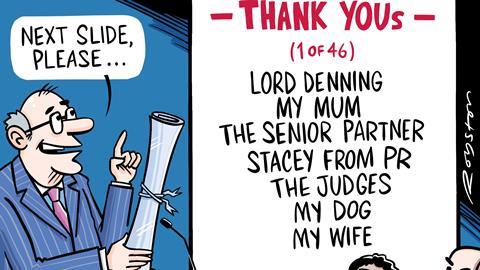All lawyers tell prospective clients and job candidates that they, their team and the firm are the best – so an award helps prove it. Maria Shahid talks to the people who know how to go about winning one
As deadlines loom for entry into some of the UK’s most prestigious legal awards, law firms and in-house legal departments across the country are gearing up to the task of assessing the various categories on offer. Legal awards have come a long way over the last 15 years or so, and as the list of awards and categories grows yearly, if not monthly, there is likely to be an award for every type and size of firm.
The lure of entering an award can be great: winning provides the external stamp of approval that not only impresses existing clients, but may bring in new ones. It raises brand awareness, and helps with a firm’s recruitment efforts and internal morale.
‘Industry awards are one of the most powerful tools to recognise leaders in the legal market, providing both media and marketing opportunities, as well as a way of standing out from your competitors,’ says communications and PR consultant Karen Levin. ‘Lawyers love the recognition that a well-respected award provides.’
Linsay Leslie is in charge of legal directories, bids and awards at consultancy MD Communications. ‘The great thing about an award submission is that it is manageable and there are lots of awards out there. So, there is an award for every type of firm,’ she explains. ‘Awards can mean a great deal if you get the right one. Externally, to GCs and other securers of legal services – from SMEs to large corporates, it provides a badge of quality and acts as a differentiator in a competitive market.’
But the art of knowing which award to submit an entry for and which is actually worth entering is not as easy as it might at first seem.
‘I would advise against entering an award for the sake of it – some are definitely more prestigious that others,’ says PR and communications consultant Antonia Welch, formerly in-house at Allen & Overy. ‘Consider carefully whether you want to enter for this particular award as a lot of effort is involved. Can you meet the criteria? Look at who has won the award in previous years. Follow the guidelines and respect the judges.
‘It may be that this year isn’t the right time to enter for an award; enter when you are in a stronger position. If you do decide to go ahead and enter, think about how you are going to justify the entry. Proof is what matters – be prepared to back up any sweeping statements.’
Levin agrees: ‘I would always advise clients to think really hard about which categories to enter. Don’t enter an award for the sake of it. Have a good story to put forward. Once you’ve identified the most relevant deals, you need to be able to say why that deal is significant. If you can’t do that in a 150-word elevator pitch it’s probably not worth putting forward.’
However, once you have established that your work is worth shouting about don’t be intimidated by previous winners – being the apparent underdog may well work in your favour.
Welch references a small boutique firm she has worked with which was shortlisted for the FT Innovative Lawyers Awards. ‘If you have an interesting story to tell it is definitely worth entering,’ she notes. And of course, those judging the award want to feel they are identifying a winner based on quality, not the firm’s brand, size or PR budget.
Strategic alignment
While there is no shortage of awards, taking a strategic approach ensures that the awards you are entering align with your firm’s overarching marketing strategy, Leslie says. ‘You need to ask yourself: Why are we doing this? What would we use this for? Who is our target market? It’s really about having that awareness.’
‘Industry awards can really help address an imbalance in terms of what a firm is known for,’ notes Welch.
Adele Baxby Meehan at Kysen PR advises firms to approach awards as you would any marketing activity. ‘Say a firm wants to reposition itself in the market or wants to raise the profile of a specific practice area, it would be worth considering entering for an award for that practice area,’ she says.
Legal industry awards such as the Law Society Awards, as well as the leading legal directories awards, the FT Innovative Lawyers Awards and the IFLR awards are some of the most prestigious and sought after by lawyers.
However, sector-specific awards such as Property Week, as well as business and chamber of commerce awards, could also be relevant and recognisable by clients and the market you are targeting.
‘You have to work out which is the right award to go for, and fits in with the ethos of your practice; for example across diversity and inclusion, sustainability and innovation,’ Leslie adds.
Check who past winners have been. This can give an indication of what a winning entry looks like, but do not be put off if you have a different profile. Judges are generally keen to promote winners with lower profiles that may not have won awards in the past.
Some awards are without doubt more prestigious than others, so as part of your due diligence exercise take a look at who is sitting on the judging panel and the criteria you are being judged against. Is there a fee involved in winning the award? How transparent is the decision-making process? Finding the answers to these questions will reveal much about the award’s integrity.
All of the well-known industry awards are judged by either veteran industry journalists or pre-eminent members of the profession. ‘I would advise my clients to do their research, and to make sure that the award they are entering has credibility – some are definitely more transparent than others,’ notes Leslie.
Tom Bohills of Chronos Law won sole practitioner of the year at the Law Society Awards in 2020. He explains why the win was particularly valuable: ‘The Law Society is hugely respected as an institution. It is seen as transparent and objective, and so it really means something to win this award.’
Preparing an entry: inside tips
So, once you have decided to enter an award how should you go about it?
Drafting a compelling awards entry that will stand out in a crowded market requires considerable thought. Having sat on the awards panel of a well-known legal award for several years myself, the ones that stood out had a story to tell and were groundbreaking in some way. Perhaps they changed the law or introduced a new process, or made a long-term impact on their client or the industry in which they operated.
If you think you are the best, what criteria are you using? This may need spelling out.
One of the most important things you can do is to create an interest around a deal or case even before you make a submission. It is worth building up a relationship with the awarding body long before the actual submission, so that they know who you are and what you have been doing.
When it comes to collating the submission, a content capture process can be helpful, says MD Communications’ Linsay Leslie. You may have the information in place from a directory submission (but make sure it’s up-to-date).
Kysen PR’s Adele Baxby Meehan emphasises the value of client input: ‘Client case studies and quotes can be helpful and can really make a submission come alive. You’ve got to articulate a really strong proposition.’
One of the most frustrating parts of judging an award can be chasing up referees. While it can be tempting to add a recognisable industry name to your awards submission, bear in mind that they may be just too busy to respond to a reference request. Do make sure that your client knows that you are entering an award and that they are in fact available to talk to. Consider including a contact that is less of an industry name but more likely to be available. Antonia Welch is very conscious of this: ‘I always tell my clients that if you need to provide referees consider who you put forward. It may just be better to put forward a less distinguished but more reliable contact.’
Finally, allow yourself enough time to collate all the information you need in order to put together an awards submission. An awards calendar can help keep a track of submission deadlines.
Maria Shahid
Tenders and beauty parades
The right award, if wrapped in a broader package of credibility markers, can play a vital role in securing a new client on a beauty parade – put simply, it looks impressive.
Drawing on her experience of working on bids and tenders, Leslie notes that ‘being able to demonstrate that you have won an award is a great differentiator. You want anything that can make you stand out from the competition and give you that credibility.’
But it is about more than just standing out from the crowd. An award provides reassurance to existing and potential clients that your firm is on the same page as them in terms of initiatives, whether that is your green agenda, or a diversity and inclusion programme.
Increasingly in-depth questions are being asked on beauty parades, as clients want to know that their potential advisers’ values align with theirs. Being able to refer to a win or shortlisting for an award such as the Law Society’s ‘Excellence in Diversity & Inclusion’ or in one of the categories in the Diversity Legal Awards, can all go a long way to demonstrating a firm’s commitment to such initiatives.
Take the case of the Law Society’s Junior Lawyer of the Year award, which was issued in memory of law student Aya Hachem, who was shot dead in 2020. Last year’s award went to Hogan Lovells associate Sengova Kailondo, who impressed the judges with his ‘brilliant high-level work as well as dedication to diversity and inclusion’. He explains that the award has not only been useful in internal communications, but has featured in pitches for new work. Not only does it demonstrate the calibre of lawyers at the firm, but the more general ethos of D&I values. It supports the idea that the client has found a firm with which it has a good cultural fit.
The gains
We are looking at a second year of awards being online-only, but even when prestigious awards return to physical ceremonies (often complete with black-tie dress code and an eminent host) the main expense is not usually booking a table, but the amount of staff and fee-earner time spent preparing an entry. So it is worth reflecting on the gains, which go further than an appeal to clients.
The right award can play a vital role in attracting talent to a firm. Lateral hires as well as senior associates want to see that the team they are joining is recognised as a leader in the field. At the junior end, seeing someone like Kailondo, whose parents escaped war-torn Sierra Leone to settle in London over 17 years ago, winning an award sends a signal to graduates and junior lawyers from similar backgrounds that Hogan Lovells is a diverse and inclusive firm.
'The award really makes us stand out with our employer brand'
Jacqueline Emmerson, Emmerson Solicitors
For staff already at the firm, even a shortlisting can give teams and individuals that are still working remotely a year on from the start of the pandemic not only kudos but a much-needed morale boost.

Emmersons Solicitors won the small firm of the year at the 2020 Law Society Awards. ‘It has really cheered up the staff given the year that they have had. It really makes us stand out with our employer brand,’ says managing director Jacqueline Emmerson.
Robert Williams, managing director at Family Law Partners, is a previous winner of the medium law firm of the year category at the Law Society Awards. He notes that in addition to the external validation for the firm, it meant ‘a great deal to the internal team to be recognised externally. It felt like the perfect culmination of many years’ work’.
Social media traction
The right award win or shortlisting can provide marketing opportunities on all of a firm’s digital platforms. Adding awards recognition to an email signature can go a long way to raising a firm’s or individual team’s profile, as can announcing a shortlisting or win to social media channels.
‘In the digital era, an award win may be more important than ever, as clients and targets look for trust signals before they buy,’ says Simon Marshall of legal marketing agency TBD marketing.

Emmerson says the firm used the win on all its social media channels, as well as on email footers and on the firm’s website. ‘We used it as a good news item to send out on mailchimp and celebrated the win across all the social media we use.’
‘It’s been very helpful on LinkedIn and got lots of traction,’ says sole practitioner of the year Bohills of Chronos Law. In addition to being useful from a marketing perspective, Bohills adds that it felt like ‘a real pat on the back after so many late nights and so much stress. It gave me a real boost’.
Is it worth the effort?
The answer is a resounding ‘yes’. The right award can send a strong signal to the market that you are a leader in the field and help a firm to stand out in a crowded market. ‘It really shows that a firm has its finger on the pulse,’ notes Welch.
'Award success has helped us secure opportunities that we might not have had otherwise'
Robert Williams, Family Law Partners
Williams at Family Law Partners sums up why winning the right award really can make a difference: ‘Award success has helped us open up new conversations and secure opportunities that we might not have had otherwise. Along with other independent feedback from sources like legal directories, they are undoubtedly a useful indicator of a firm’s “brand health” through the eyes of clients, business contacts and future talent alike.
‘When the right scheme and category come along we believe entering can make a significant positive difference to our reputation and profile, as well as that all-important fillip for the team.’
Maria Shahid is a freelance journalist
- The Law Society Awards 2021 are open for entries until 21 May. There are 20 categories to choose from, covering individual, team and firm awards across practice areas and specialisms.
The Law Society is running a masterclass for our new Excellence in Promoting Ethical Standards award on 12 May, 2pm.
Find out what kinds of projects will be considered, and top tips to make your entry stand out.
































No comments yet